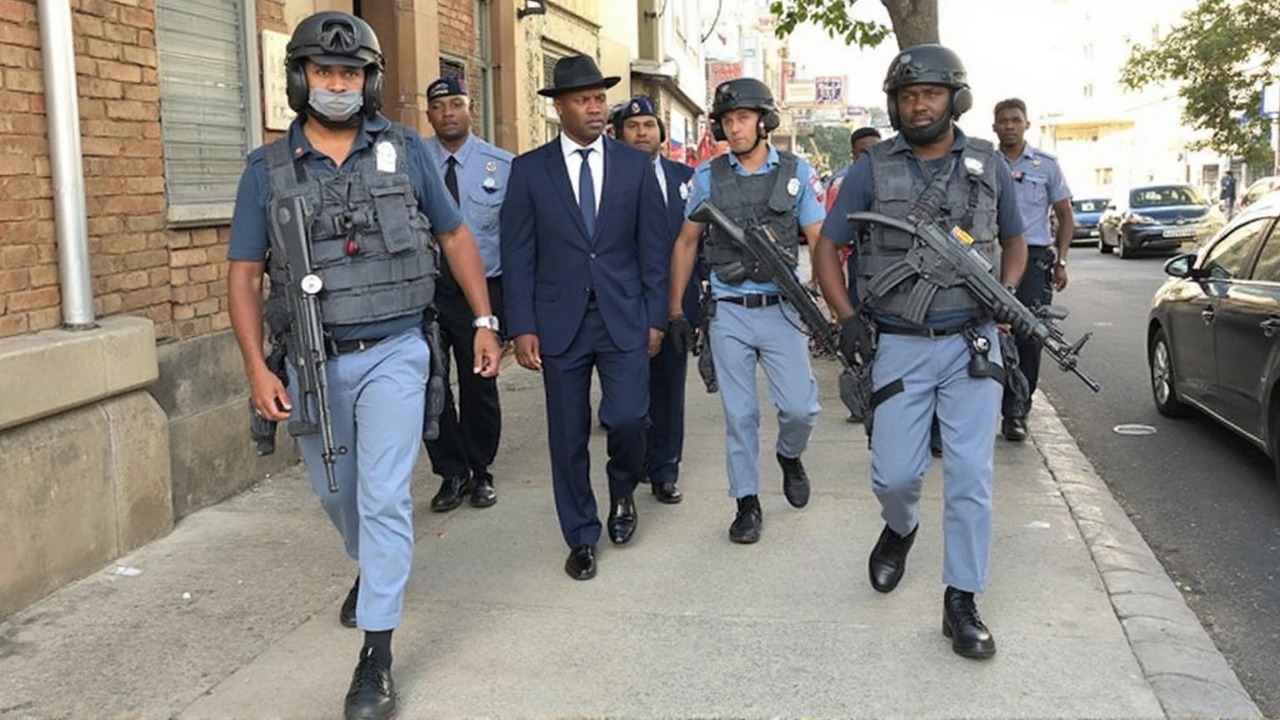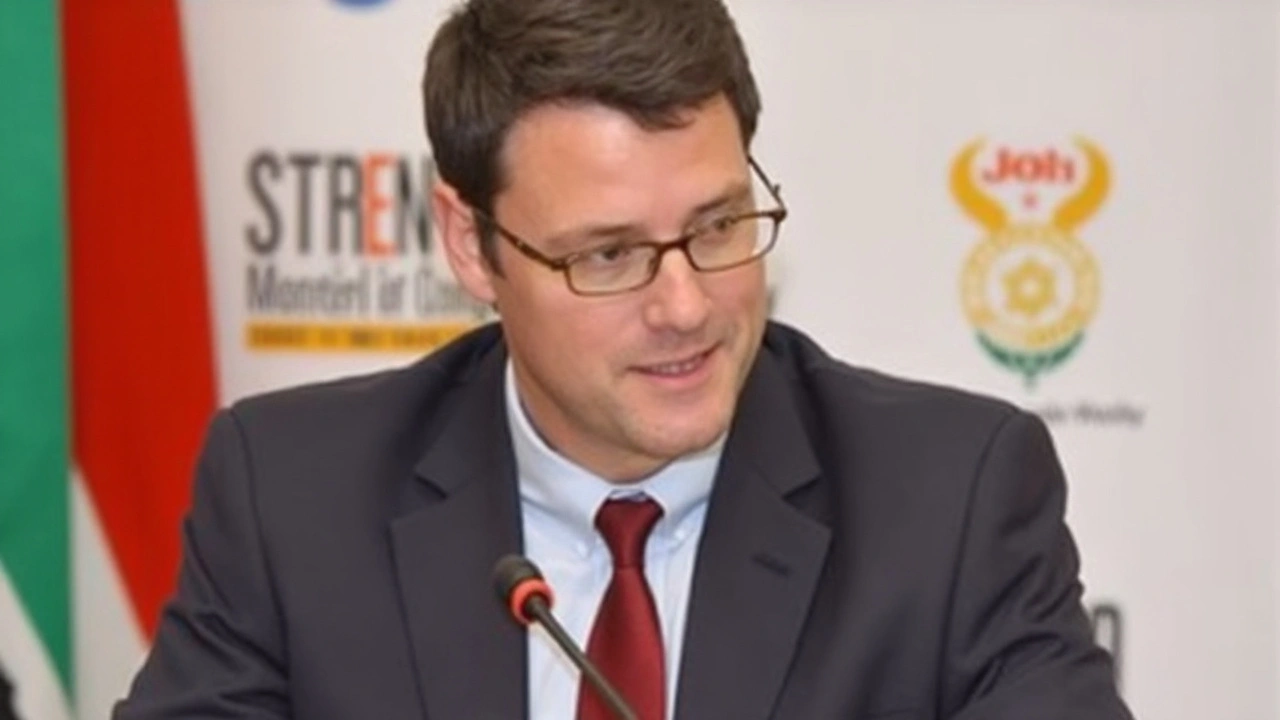Andrew Whitfield’s Dismissal: A Tipping Point for South Africa’s Wobbly Coalition
Talk about political earthquakes—when President Cyril Ramaphosa wielded his constitutional axe under Section 93(1) and let Andrew Whitfield go as Deputy Minister of Trade, Industry, and Competition, the news ricocheted through South Africa’s fragile coalition like a shockwave. The official word from the Presidency was polite, almost formulaic, thanking Whitfield for his service and moving on without explanation. The silence only fueled speculation, fanfare, and plenty of finger-pointing.
No one grabbed the megaphone quicker than DA party leader John Steenhuisen. He wasn’t just upset—he called the removal a “calculated assault,” blasting Ramaphosa for what he saw as a strategic cull of a political thorn. According to Steenhuisen, Whitfield didn’t just do his job—he rattled cages. This included taking firm stances on touchy topics like the contentious transformation fund and the much-debated national lottery tender. Within hours, the DA set a firm line in the sand: Ramaphosa has 48 hours to rethink Whitfield’s removal or face consequences, though they kept their cards close about what those consequences might actually look like.

Tension Behind the Scenes: Unauthorized U.S. Diplomacy and Alliance Cracks
So why did Whitfield fall out of favor so suddenly? Whispered reports point to a March 2025 trip—Whitfield and a DA team apparently hopped over to the United States, where they met with lawmakers and some Trump-era officials. The intent? Allegedly, to talk stability and boost relations between the two countries. The catch: none of this had a green light from Ramaphosa’s government. That’s a big red flag in the world of coalition politics, where every unsanctioned handshake or photo-op can quickly spiral into crisis.
The fallout was swift inside DA circles as well. Helen Zille, who chairs the DA’s federal council, called party leaders together in an emergency Federal Executive session. With emotions running high, the party scrambled to plot its next steps in a coalition setup that’s always teetering on the brink of instability.
On the opposite side, the ANC was far more relaxed. Party spokesperson Mahlengi Bengu-Motsiri welcomed Ramaphosa’s decisive move, saying it was well within his Andrew Whitfield constitutional mandate to pick and drop ministers to shape the kind of executive needed for effective governance. In their eyes, the removal wasn’t sabotage—it was simply business as usual, showing the President could still call the shots amid coalition give-and-take.
It’s not all-out war, though. Despite high-profile blowups and threats, the DA sent strong signals that it wouldn’t abandon its parliamentary duties—at least for now. They pledged full support for the upcoming 2025 national budget, hinting that political brinkmanship won’t upend day-to-day governance. With both sides digging in, South Africa’s grand experiment with coalition government is watching another plot twist unfold, and nobody’s quite sure where the next surprise will come from.

Ify Okocha
June 27, 2025 AT 00:10The removal of Whitfield is a textbook example of political opportunism masquerading as governance.
Ramaphosa invoked Section 93(1) like a blunt instrument, ignoring the delicate balance a coalition demands.
The DA’s outburst is predictable, but it doesn’t change the fact that an unauthorized US trip violates standard protocol.
Any minister who steps outside the chain of command erodes the executive’s credibility.
South Africa’s coalition was already fragile; pulling a senior figure only deepens the fissures.
Whitfield’s stance on the transformation fund was never the pivot, it was the symptom of deeper ideological rifts.
The ANC’s calm response reflects a strategic calculation, not a lack of concern.
By framing the dismissal as “decisive”, the presidency sidesteps accountability, a classic power‑play.
In practice, this move will likely trigger internal DA debates that distract from policy work.
Historical precedent shows that such sudden cabinet shakes rarely strengthen governance; they breed mistrust.
The public narrative of gratitude is a thin veneer over a ruthless political purge.
Meanwhile, the budget process will proceed, but expect hidden negotiations in the background.
Coalition partners will now leverage this incident to extract concessions, complicating the legislative agenda.
International observers will note the US‑South Africa liaison misstep as a warning sign for diplomatic protocol.
Overall, the episode underscores how personal loyalties and power grabs continue to dominate South African politics.
It also serves as a reminder that constitutional mechanisms can be weaponised without substantive justification.
William Anderson
July 8, 2025 AT 20:40Behold the drama of ministers being tossed like unwanted laundry!
The phrasing “let Whitfield go” reeks of bureaucratic complacency, a phrase that would make any style guide weep.
One cannot help but notice the lack of parallel structure in the official statement – “thanking Whitfield for his service and moving on without explanation” is a clumsy concatenation of gerunds.
And yet, the political theater continues, with the DA brandishing accusations as if they were Shakespearean soliloquies.
The irony is palpable: a leader who claims to champion democracy employs a removal method that feels more autocratic than the opposition’s lamentations.
The entire saga reads like a badly edited script, full of redundant clauses and vague pronouns.
In short, the situation is a masterclass in how not to conduct a dignified governmental transition.
Sherri Gassaway
July 20, 2025 AT 17:06In the grand tapestry of statecraft, each thread pulled reverberates through the collective consciousness.
Whitfield’s dismissal is not merely a personnel shift; it is a microcosm of the tension between sovereignty and external influence.
The unsanctioned dialogue with US officials raises questions about the locus of legitimacy – does authority reside in elected mandates or in clandestine diplomatic overtures?
Such moments force us to confront the paradox of a coalition that aspires to unity yet is perpetually haunted by divergent visions.
When power is exercised without transparent consent, the fabric of trust unravels, leaving governance vulnerable to existential doubt.
One might argue that the true cost of this episode is not measured in political capital alone, but in the erosion of the social contract that binds citizen and state.
Thus, the episode serves as a stark reminder that the health of a democracy is contingent upon the integrity of its procedural rituals.
Milo Cado
August 1, 2025 AT 13:33It's encouraging to see that despite the headlines, the essential functions of government keep moving forward 😊.
Both the ANC and the DA have signaled a willingness to cooperate on the upcoming budget, which suggests that pragmatic governance can survive political turbulence.
Open dialogue and mutual respect will be key to steering South Africa through these challenges; let's hope the parties keep the conversation constructive.
In the long run, this could be an opportunity for the coalition to refine its internal processes and emerge stronger.
Stay hopeful, folks – progress often sprouts from the most unexpected soil! 🌱
MONA RAMIDI
August 13, 2025 AT 10:00Whitfield’s ouster is pure theatrical nonsense.
grace riehman
August 25, 2025 AT 06:26Hey everyone, let’s keep the convo respectful and remember that political moves affect real people.
Even if you think the DA overreacts or the ANC is too chill, the citizens of SA deserve clear info.
So, try not to jump to conclusions without checking the facts first, ok?
We all wanna see a stable government that works for us all.
Vinay Upadhyay
November 19, 2025 AT 23:10Oh great, another minister dismissed because someone dared to talk to a foreign power without a note from the president. How original.
Obviously this is a sign of robust democracy, not a power‑play that sidesteps proper protocol. 🙄
Meanwhile, the DA will likely spend the next week polishing its press releases while the ANC pretends this is just business as usual.
One could even argue that the whole circus is a masterclass in why coalition governments rarely function without constant drama.
But hey, at least we have some fresh material for our evening debates.